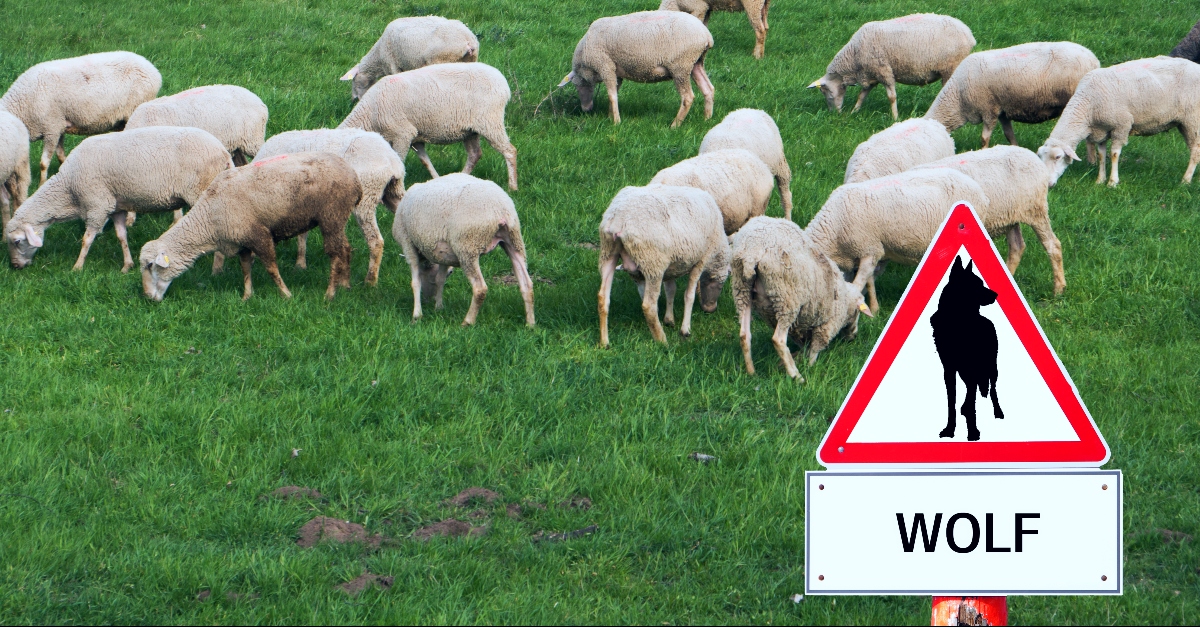
You’ve probably heard the phrase, “Watch out for wolves in sheep’s clothing.” Or "he's a wolf in sheep's clothing." Maybe someone spoke them to you in warning, or perhaps you were the one cautioning someone you love. Our meaning hasn’t changed much since this ancient idiom first emerged. In short, it means sometimes those who appear harmless and kind cause the deepest damage and pain.
The History of “a Wolf in Sheep’s Clothing”
What is the history of the phrase 'a wolf in sheep's clothing'? Some assume this well-known saying originated with Scripture, but this is not the case. Historically, we first find these words in Aesop’s Fables, written by a 6th century B.C. Greek slave. These anthropomorphic tales, originally shared orally to teach children moral lessons, can be found, printed and bound, in homes across the globe.
We can see the theme of malicious trickery in other works as well. For example, Buddhist literature compares deceptive monks to a murderous wolf disguised as a ram. This story warns against those who perform religious acts while hiding an evil heart.
The Buddhists and Aesop’s Fables share another similar and related tale of a donkey who disguised himself as a lion to scare people. A fox, however, wasn’t fooled. Then there is the tale of a peddler who disguised his donkey as a lion in order to access the nearby fields. Initially, the people were afraid and left the animal alone. But then one day, the animal brayed, shattering his cover. Realizing they’d been fooled, the field workers club the donkey to death.
As you can see, by the time of Jesus, the warning to watch out for wolves in sheep’s clothing had worked its way into first century culture.
Photo Credit: © Unsplash/Marek Szturc

A Synopsis of the Classic Story
This tale begins with a hungry wolf struggling to survive in the jungle. Too weak to hunt, he worries he will soon die. Then, wandering about in search of food, he comes upon a flock of sheep and their sleeping shepherd. The wolf seizes the opportunity and attacks and eats a fat sheep. His momentary satiation motivates him to develop a plan. He wraps himself in the hide of the killed sheep and joins the flock. None, the shepherd included, are the wiser.
This costume allows the wolf to hunt undetected, night after night, sheep after sheep. Eventually, the shepherd notices a loss and counts his sheep, first one day, and then the following. Realizing something is amiss, at nightfall he watches from a place of hiding as one of the flock attacks and eats another. Accurately discerning the situation, the shepherd beats the wolf off with a stick. The moral? Outward appearances can be dangerously deceiving.
"A Wolf in Sheep's Clothing" In Scripture
Jesus’s use of this common idiom conveyed a similar meaning. “Watch out for false prophets,” He said. “They come to you in sheep’s clothing, but inwardly they are ferocious wolves” (Matthew 7:15). Shortly before, He had instructed His listeners to “Enter through the narrow gate” (Matthew 7:13), or the harder to follow, counter-cultural path. “For wide is the gate and broad is the road that leads to destruction,” He said, “and many enter through it.” As indeed many of the religious elite, a number of whom were themselves wolves in sheep’s clothing, had. “But small is the gate and narrow the road that leads to life, and only a few find it” (Matthew 7:14).
Jesus later expanded on this idea in John 10, when He said, “Very truly I tell you Pharisees, anyone who does not enter the sheep pen by the gate, but climbs in by some other way, is a thief and a robber” (John 10:1). I imagine many in his Greek-influenced audience thought not only of local shepherds guarding their sheep, but also of the popular Aesop’s fable that warned them to remain alert and aware.
How would they know who they could trust? Whereas false shepherds are selfishly motivated (Ezekiel 34) and conniving (Jeremiah 10:21; 50:6), “[t]he good shepherd lays down His life for the sheep” (John 10:11). This is precisely what our Savior did (John 10:18).
The Significance of Sheep in Scripture
As with all literature, the Bible utilizes various figures of speech, such as idioms, hyperboles, and metaphors to convey a message. Scripture mentions sheep more than any other animal in Scripture. Largely helpless animals, they’re timid, easily confused and known to wander, and therefore must be watched with patience and diligence.
Drawing an analogy between us easily-swayed humans and these senseless animals, Isaiah wrote, “We all, like sheep, have gone astray, each of us has turned to our own way;” (Isaiah 53:6). Jesus also referenced this tendency in Matthew 18 when He said, “What do you think? If a man owns a hundred sheep, and one of them wanders away, will he not leave the ninety-nine on the hills and go to look for the one that wandered off?” (v. 12, NIV).
His words revealed our Father’s merciful response to our rebellious tendencies. When we leave that narrow path He so lovingly carved out for us, He doesn’t treat us as our sins deserve. Instead, He relentlessly pursues us and lovingly brings us back to His protective fold.
Photo Credit: ©iStock/Getty Images Plus/Animaflora

What the Bible Says about Wolves
The Bible often equates wolves with cruelty, betrayal, and malicious deception. For example, speaking of ancient Israel’s rebellious leaders, Jeremiah 5:6 states, “So now a lion from the forest will attack them; a wolf from the desert will pounce on them. A leopard will lurk near their towns, tearing apart any who dare to venture out. For their rebellion is great, and their sins are many” (NLT).
Of this verse, theologian Charles Ellicott suggested these three animals represented “fierceness, ravenousness, and cunning” perhaps embodied in one invader. According to former minister Joseph Benson, the powerful foe would be as “rapacious, greedy, and devouring as a wolf.”
We find similar imagery in Zephaniah 3:3, only this time referring to the nation of Israel itself. “Its leaders are like roaring lions hunting for their victims. Its judges are like ravenous wolves at evening time, who by dawn have left no trace of their prey” (NLT). Or, as the NIV phrases it, “who leave nothing for the morning.” In other words, the very ones tasked with upholding justice cruelly oppressed the people.
We see another reference, once again from Jesus Himself, in Matthew 10:16. Speaking to His disciples before they embark on a missionary assignment, He said, “I am sending you out like sheep among wolves. Therefore, be as shrewd as snakes and as innocent as doves” (NIV). Jesus was warning them that they’d receive persecution despite their sincerity. Therefore, they’d need to remain alert and wise.
As you can see, our culture has retained the original meaning of this phrase, likely first spoken by a former Greek slave, over the years. But understanding its etymology along with the rich symbolism surrounding it adds depths to Christ’s words. In choosing such a vivid idiom, He revealed the dangers of spiritual deception and the evil cunning behind those who deceive. And so, He urged us to watch out for those who seek to nudge us off of that clear, safe path of the gospel and onto the wide and painful road of destruction.
Further Reading
What Are Modern Examples of a ‘Wolf in Sheep’s Clothing’?
5 Ways to Recognize "A Wolf in Sheep's Clothing"
How to Beware of the "Wolf in Sheep's Clothing"
Photo Credit: © Unsplash/Vincent Van Zalinge
Jennifer Slattery is a writer and speaker who co-hosts the Faith Over Fear podcast and, along with a team of 6, the Your Daily Bible Verse podcast. She’s addressed women’s groups, Bible studies, and taught at writers conferences across the nation. She’s the author of Building a Family and numerous other titles and maintains a devotional blog at JenniferSlatteryLivesOutLou
She’s passionate about helping people experience Christ’s freedom in all areas of their lives. Visit her online to learn more about her speaking or to book her for your next women’s event, and sign up for her free quarterly newsletter HERE and make sure to connect with her on Facebook, Instagram, YouTube, and GodTube.
This article is part of our larger resource library of popular Bible verse phrases and quotes. We want to provide easy to read articles that answer your questions about the meaning, origin, and history of specific verses within Scripture's context. It is our hope that these will help you better understand the meaning and purpose of God's Word in relation to your life today.
This Is the Day the Lord Has Made
Iron Sharpens Iron
Blessed Are the Peacemakers
Faith without Works Is Dead
Be Anxious for Nothing








